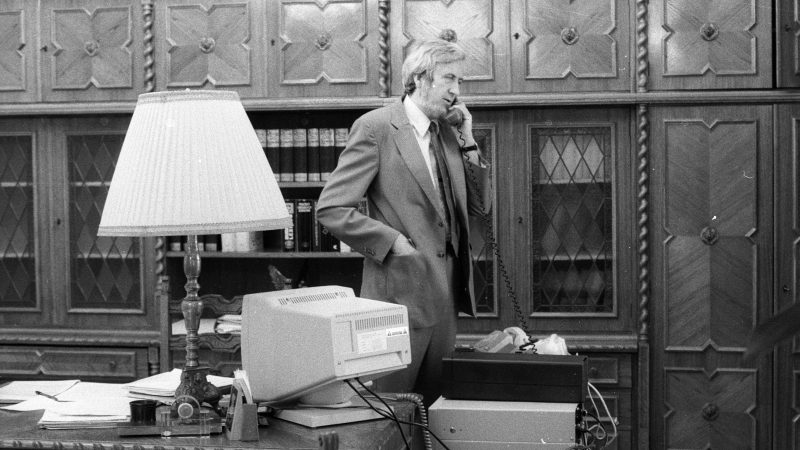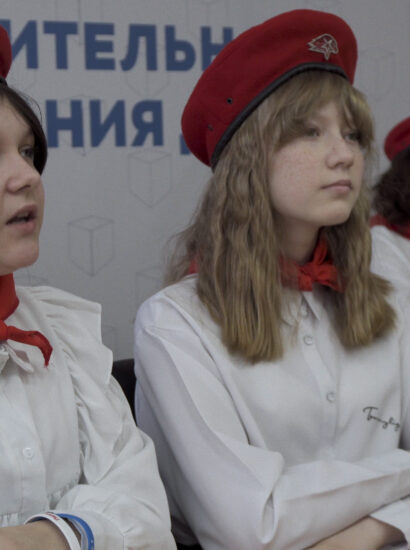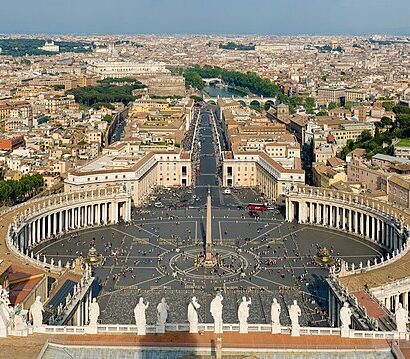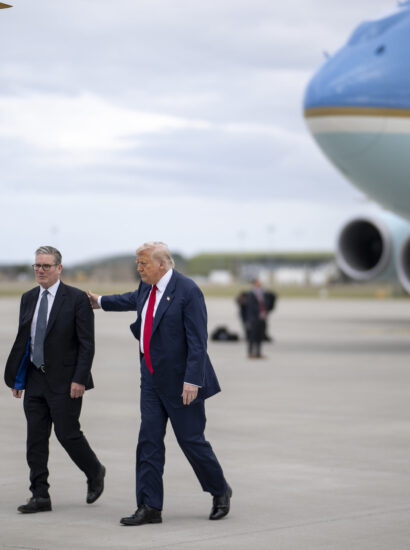As foreign minister of the first free government after the regime change in 1989, Géza Jeszenszky had a great influence on the foreign policy strategy of the Hungary, which embarked on a long period of Western integration after liberation from foreign oppression. Although he is no longer active in politics, we were curious to hear his views on issues shaping the world and Hungarian public life, such as the US-Russia-China triangle, the decline of multilateralism and the current state of Central European cooperation.
The former ambassador to the US and then Norway said it would be a mistake to abandon Hungary’s Euro-Atlantic integration and that the Orban cabinet should also cultivate good relations with neighboring states, especially the militarily stronger Ukraine.
Our interview with historian, university professor, diplomat, author of several books, articles, Géza Jeszenszky.
As a former foreign minister, what is your view on modern diplomacy? Have we entered a new era where the old diplomatic rules no longer apply?
Diplomacy itself is an ancient art, with countries using it as far back as the ancient East sending envoys. In the modern era, the Venetian Republic established a systematic method of conducting foreign relations, and its forms have remained essentially unchanged over the centuries.
Nowadays, e-mails and secure e-mails have replaced letters, telegrams, and cipher telegrams for intergovernmental communications. However, personal contacts and negotiations are still ongoing, and in fact, they are even more intense.
Despite today’s convenient transportation options formal or highly significant issues are still primarily addressed through face-to-face negotiations or written correspondences.
Do you agree with the peculiar statement that large international organizations, excluding NATO, are becoming less significant in global affairs? In light of this, what role do you think intergovernmental institutions like the United Nations (UN) will play in the future?
It is regrettable that the UN has lost its efficacy and is now criticized as being more of a “vote shop” than a capable body. Considering the fate of its predecessor, the League of Nations, it is not improbable that the UN might eventually suffer a similar fate. However, there was a time (in the early 1990s) when Hungary was a non-permanent member of the UN Security Council (UN SC) and that offered better possibilities to present our interests.
I would like to share a personal experience, the highlight of my career was representing Hungary at a special Security Council summit in 1992. A photograph published on the front page of the New York Times depicted me in the middle of Boris Yeltsin and George W. H. Bush, walking side by side.
The first democratically elected Hungarian government, the Antall administration anticipated practical advantages by becoming a member of the Security Council: progress on the national minorities matter could be better achieved in this forum as well. At the beginning of the 1990s, there was a general feeling that the issue of national minorities had to be resolved because it had been pushed into the background after the Second World War, and the emphasis was on human rights in general. One of the reasons why the UN was pushed into the background was the adoption of the veto, which would have worked if the Soviet Union had not been out of line and not vetoed so many resolutions.
As to NATO, the Alliance is as important as it was during the Cold War, just think of the aggression committed by Russia against Ukraine.
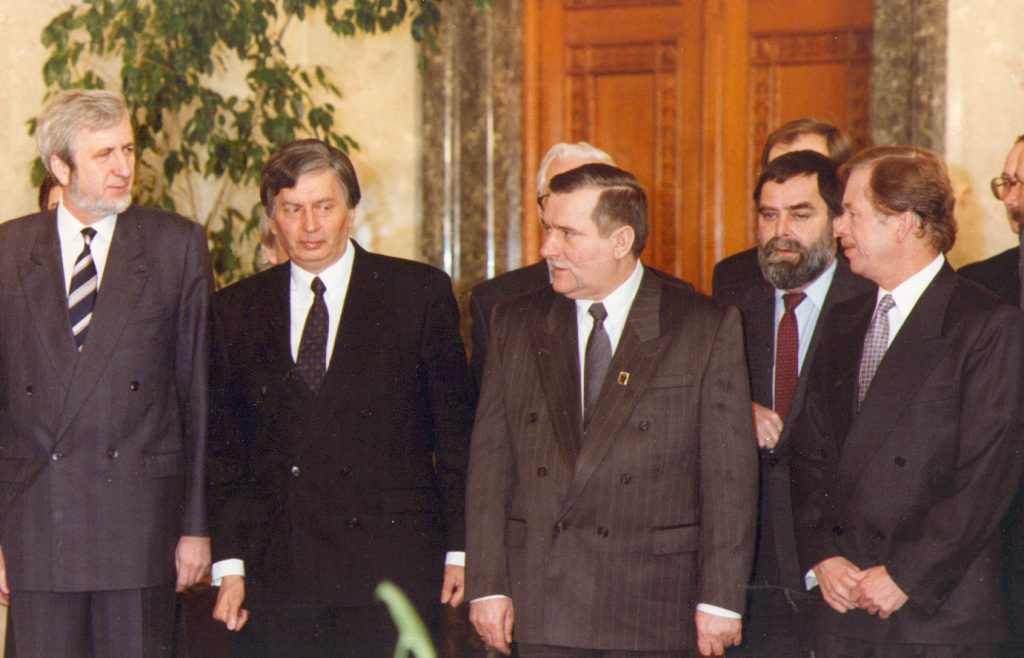
Foreign minister Géza Jeszenszky, Hungarian prime Minister József Antall, President of Poland Lech Walesa, President of Czechoslovakia Vaclav Havel in 1991 (Source: Géza Jeszenszky)
How is the role of the Euro-Atlantic region changing in this new environment? What is the current relationship between the European Union and the United States? Are we talking about equal partners, or are those right who say that the EU is only a servant of Washington’s interests?
Many people mistakenly think that America is turning away from Europe for some reason. The US only wants the European countries to do more of their share of common defense spending. It would leave it mainly to Europe to maintain its own security, even if it does not think of disbanding NATO. In Hungary, we often hear as propaganda – which I think is completely unfounded – that the United States interest to weaken Europe. Obviously, some people take this seriously. There may be Americans who share this view. Of course, there is some rivalry between the two pillars of the free world, and there are also, let us say, economic differences or diverging interests vis-a-vis the European Union. I, as an Atlanticist, do not share that view. I have been an Atlanticist not only since I became a minister, but also, so to speak, since my childhood. My family background is anti-Nazi and anti-Communist.
I would consider the disintegration of the European Union, or the weakening of the transatlantic ties a tragedy – for the whole of mankind.
There may, of course, be parties in Europe that preach this – Viktor Orban’s party or his government is not alone in saying that we must create a “Europe of fully sovereign nations”. I want to see a strong EU, but not a United States of Europe.
What do you think about the prediction that has been made in several places that the second third of the century will bring the final twilight of Europe (and the US) and the dawn of Asia (especially China and India)?
I don’t believe the preachers of the twilight of the West. The military, economic and intellectual strength – and the democratic establishment – of the Euro-Atlantic countries will survive today’s difficulties and their mistaken fashions like political correctness will hopefully disappear. India is in many ways a growing power, and its population may soon surpass that of China. Apart from the fact that India still has spectacular poverty, there is strength in its economy. Militarily, it is obviously no match for China today, but I think a Sino-Indian conflict is unlikely today. Of course, border conflicts occurred in the past and may still occur, but China is more likely to turn its attention to Taiwan and its other neighbors. It wants to annex Taiwan and turn its neighbors into a kind of satellite, which of course these countries are very afraid of. But even so, a great friendship between India and China is unthinkable at the moment.
What do you think of the reality of a materialization of an anti-American Russo-Chinese alliance?
The West is China’s number one adversary, but this does not mean that Russia is its ally –see Beijing’s half-hearted support for Moscow in its war against Kyiv. Nor should we forget that less than half a century ago, the two locked arms along the Ussuri River. Sparsely populated Siberia, with its vast reserves of natural resources, is very attractive to overpopulated China.
China is likely to become an even more powerful presence in Siberia, and the best way to achieve this (short of invasion) is for Russia to emerge weakened from the current war against Ukraine.
Besides, Moscow is already dependent on Beijing, oil and gas are mainly supplied to China, and this is a very important source of income. China is only observing the conflict and it is most interested in prolonging the war. Although, it is not interested in seeing Russia’s downfall.
Moving on to Hungary and the Central European region. How do you see the modifications of the three main objectives (Euro-Atlantic integration, good neighborly relations and the Hungarian issue beyond the borders), which defined our foreign policy in the 1990s, in the last decade under the Orban administration?
It is unclear why the Hungarian government and its representatives are inciting adversity towards our allies and endorsing Russia’s current regime.
It is inexplicable that Hungary’s foreign policy is unfriendly towards our Western allies and envisages the ascent of the East’s new sun over declining West’s.
Hungary, currently embroiled in a propaganda campaign against Brussels – i.e. the European Union – by threatening it with vetoes, dissolution of the EU, supporting Ukraine’s self-defence, at best half-heartedly, and maintaining close relations with dictatorships, is widely considered to be an unreliable and hesitant ally abroad. It is seen as a Trojan horse of authoritarian Eastern regimes and an agent serving Russian President Putin.
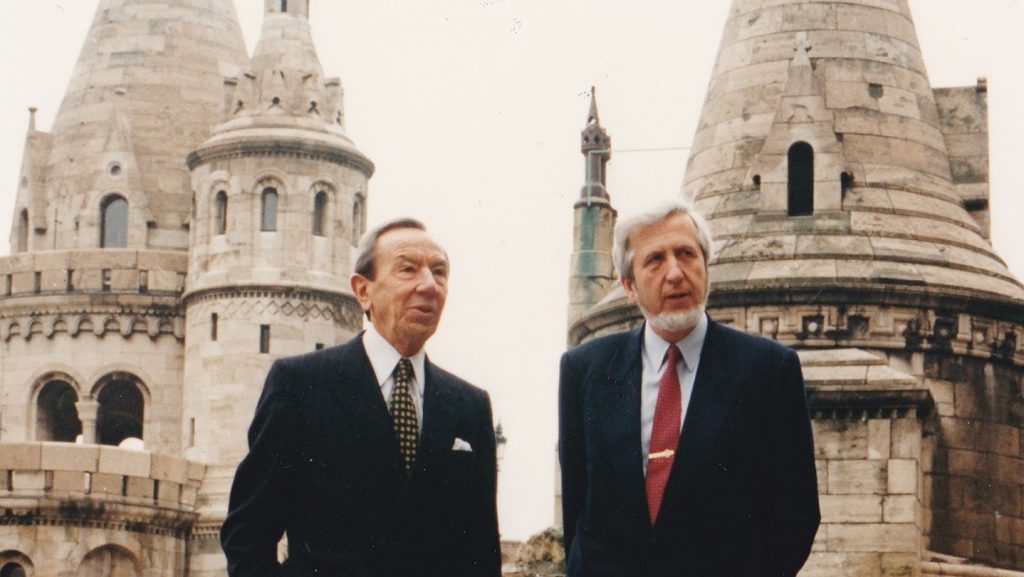
With US Secretary of State Warren Christopher (Source: Géza Jeszenszky)
The Antall government, on the other hand, established a relationship of trust with the democratic states. Its basic aim was to join the (then so called) European Community as soon as possible. It perused a Western orientation, and welcomed a strong Europe, closely cooperating with North America. This is what we saw our future. We did not beat around the bush, but we were fearful, as József Antall said, that if the Russian bear sleeps well, it might wake up and cause problems. Time has proven him correct, as we observe the turmoil in our neighborhood.
How does the rebuilding of Hungary’s “lost prestige” – which phenomenon you happened to write a whole book – happened in the post-communist period? Compared to that, how is our international recognition now?
Hungarian prestige, which was restored and strengthened in 1956 and in 1989–90 , has been lost again. Distrust of the Hungarian government among our allies and friends is growing, and the largely well-founded accusations from Brussels are having serious economic and financial consequences.
The Visegrad Four and the special Hungarian-Polish friendship are currently in ruins. Poland’s influence in the ongoing war is significantly amplified. Depending on the outcome, a strong coalition with Ukraine could be formed, taking into account the positive relations between Poland and Ukraine until recently (except in case of a complete Russian victory resulting in Ukraine’s annihilation, making it a frontline state). Additionally, I propose adding the Baltic states and Romania to this bloc. This emerging alliance will no doubt carry significant weight and is unlikely to turn against Western Europe. However, it will inevitably gain political autonomy within a united Europe, and potentially even do so economically in the future. This is my optimistic view, grounded in reality, that Europe is not weaken.
Central European cooperation reached its peak during your Foreign Minister’s tenure but now it is in stalemate. Can it be rebuilt to a normal level?
Almost any misstep can be corrected if it is done in time. However, entering two world wars was hardly correctable. To fix the current situation, a complete conceptual shift is necessary, which will require new personnel. Currently, our neighborhood policy is moving in the opposite direction, as evidenced by the Prime Minister’s speeches in Transylvania, in Tusnadfurdo, or his support for the populist Fico-party in Slovakia.
Considering our increasing separation from the West, and turning towards the East a futile endeavor? It’s worth noting that this isn’t a revolutionary idea from Orban – the shift began during the Gyurcsany–Bajnai administrations in the late 2000s.
The Hungarian economy’s opening to the East has not been successful, and Hungarian exports to the East have decreased instead of increasing over the past twelve years. The hindrance to more substantial trade is the absence of a commodity base. In the case of China, its technological advancements and successful feats in space and telecommunications are praiseworthy, but its neighbors in the Far East fear its armament. In the domestic pro-government media, little attention is given to the oppressive treatment of the Uighurs, who have been imprisoned in re-education camps en masse. Additionally, Chinese colonization of Xinjiang and Tibet is hardly mentioned, and the prolonged Hong Kong struggle for freedom is overlooked. Overall, closer ties with China have proven to be harmful. Orwell’s nightmarish portrayal of an omnipresent, omnipotent government, with control extending to even the innermost workings of the mind, is coming to fruition in China.
Finally, a question about Hungary’s position. Where do you see the country’s position on the international scene?
We are clearly in the Euro-Atlantic area, and we can also it is all right to have economic relations with the world outside the Euro-Atlantic area. The Germans and the French trade with the Eastern countries in the same way.
It is in Hungary’s interest that our national goals should prevail within NATO and the European Union. Within the European Union, the many small states can indeed counterbalance the superiority of the large states.
When I was ambassador in Norway, I was impressed seeing the cooperation between the Nordic countries and I proposed and called for closer relations between the V4, the three Baltic states and the Nordic five. There was some willingness to do so in Hungary at that time. These states, members of the European Union with the exception of Norway, could have formed a very serious interest group. Small, independent but, if you like, proud democracies.

